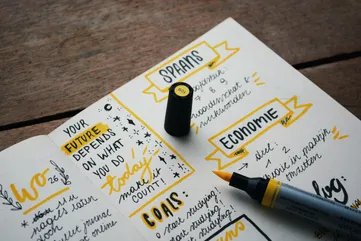Career Development Coaching
Career development coaching guides teens through systematic exploration of interests, values, and aptitudes while building professional skills and creating actionable plans for education and career paths.
Why systematic development works
Career development coaching applies vocational psychology principles recognizing that career identity develops through exploration and experience rather than sudden insight. Holland's RIASEC model and Social Cognitive Career Theory provide frameworks for understanding how interests, abilities, and environment interact in career development.
Research indicates that structured career development during adolescence correlates with better college outcomes, reduced major changes, and improved job satisfaction in early careers. The process builds decision-making skills, self-awareness, and professional capabilities valuable beyond specific career choices.
Lent et al. (2002) demonstrate that Social Cognitive Career Theory accurately predicts career development outcomes through self-efficacy and outcome expectations. Gati and Tal (2008) found that systematic career decision-making processes reduce career indecision and improve satisfaction with choices.
You're not alone
If college discussions trigger anxiety because your teen has "no idea" what they want to study, you're facing a universal challenge. The pressure to choose expensive education paths without career clarity overwhelms families. Many parents feel caught between pushing exploration and allowing natural development. Career development coaching provides framework for this exploration without forcing premature decisions. Families working with career coaches report reduced stress and more productive conversations about the future.
What it looks like day to day
Student
Your teen systematically explores three career interests through research, informational interviews, and hands-on projects, building a portfolio demonstrating genuine engagement.
Parent
You shift from asking "What do you want to be?" to discussing skills they're developing and experiences they're gaining through structured exploration.
Tiny steps to try
Support systematic career development through structured exploration and documentation.
- 1
Values clarification
Help your teen identify what matters: creativity, stability, helping others, intellectual challenge. Career satisfaction aligns with values more than interests.
- 2
Strength spotting
Notice what comes easily to your teen that others struggle with. Natural strengths often indicate career directions.
- 3
Experience documentation
Create a portfolio documenting projects, achievements, and learnings. This builds confidence and provides concrete evidence for applications.
- 4
Skill gap analysis
Identify skills needed for potential careers and create plans to develop them through courses, projects, or experiences.
- 5
Networking practice
Teach professional communication through thank-you notes, LinkedIn profiles, and appropriate adult interactions. These skills serve any career.
Why career development coaching matters
Career development coaching provides structure and support for navigating increasingly complex education and career landscapes that teens must navigate earlier than previous generations.
Career development focus areas:
• Self-assessment of strengths and values
• Career research and exploration
• Education pathway planning
• Professional skill development
• Portfolio and resume building
• Interview and networking preparation
This isn't pressure to decide everything now but guided exploration building confidence and clarity.
References
Gati, I., & Tal, S. (2008). Decision-making models and career guidance. In J. A. Athanasou & R. Van Esbroeck (Eds.), International handbook of career guidance (pp. 157-185). Springer.
Lent, R. W., Brown, S. D., & Hackett, G. (2002). Social cognitive career theory. In D. Brown (Ed.), Career choice and development (4th ed., pp. 255-311). Jossey-Bass.
Ready to help your teen thrive?
Get personalized 1-on-1 coaching to build better habits and boost grades. Join 10,000+ families who trust Coachbit.
Frequently Asked Questions
How is career development different from academic planning?
Academic planning focuses on course selection and college preparation. Career development encompasses broader exploration of how interests, values, and skills translate into fulfilling work. While overlapping, career development might reveal alternative education paths like trade schools, gap years, or entrepreneurship that traditional academic planning might miss. Integration of both provides comprehensive future preparation.
What if career coaching pushes my teen toward certain paths?
Quality career development coaching is exploratory, not prescriptive. Coaches help teens discover their own interests and values rather than imposing external expectations. The goal is expanding awareness of possibilities while developing decision-making skills. Be wary of anyone pushing specific careers or education paths. Good coaching empowers teens to make informed choices aligned with their authentic selves.
Related Terms
Career Coach
A career coach helps teens explore interests, identify strengths, develop professional skills, and make informed decisions about educational and career paths.
College Readiness
College readiness encompasses the academic skills, executive functioning abilities, self-advocacy capabilities, and life skills teens need to successfully transition to and thrive in college.
Goal Setting
Goal setting is the process of identifying specific, achievable objectives and creating actionable plans to reach them within defined timeframes.
Related Articles

5 Goal Setting Principles to Motivate Kids
The 5 principles of goal setting can help kids to set and accomplish goals that are achievable. Effective goal setting can be motivation for kids.
Read article
3 Ways an Executive Functioning Coach Can Help Your Child
Discover why executive functioning skills are crucial for your child's success. Learn how an executive functioning coach can make a difference
Read article
How Trying Different Hobbies Can Benefit Your Kids
Research suggests that allowing kids to explore a variety of hobbies, rather than limiting them to specialize in one area, promotes grit and creativity.
Read article
